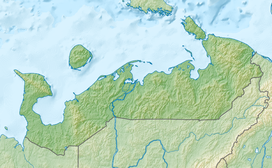The Pay-Khoy Range[1] (Russian: хребет Пай-Хой) is a mountain range at the northern end of the Ural Mountains. It lies within the Nenets Autonomous Okrug.
| Pay-Khoy Range | |
|---|---|
| хребет Пай-Хой | |
 Folded layers of rock of the Pay-Khoy Range at the Silovayaha River | |
| Highest point | |
| Peak | Morye-Iz |
| Elevation | 423 m (1,388 ft) |
| Coordinates | 69°25′39″N 62°12′32″E / 69.42750°N 62.20889°E |
| Geography | |
| Country | Russia |
| Federal subject | Nenets Autonomous Okrug |
| Range coordinates | 69°12′13″N 62°36′28″E / 69.203553°N 62.607785°E |
| Parent range | Urals |
| Geology | |
| Orogeny | Cimmerian Orogeny |
| Age of rock | Late Triassic - Early Jurassic. |
| Type of rock | Sandstone, marl, limestone and crystalline shale |
| Climbing | |
| Easiest route | From Amderma |
Geography
editThe ridge is extended from northwest to southeast. It is located on the Yugorsky Peninsula, in the eastern part of the Nenets Autonomous Okrug. The ridge continues to Vaygach Island, thus separating the Barents Sea and the Kara Sea. The highest point of Pay-Khoy is the mountain of Moreiz (467 metres (1,532 ft)).[2] The range separates the drainage basins of the Korotaikha River (west, Barents Sea) and the Kara River (east, Kara Sea).
The areas around Pay-Khoy do not have permanent population. The closest permanent settlements are Amderma and Ust-Kara, Nenets Autonomous Okrug The range is located in the tundra, to the north of the tree line.
Geology
editThe Pay-Khoy range forms a curved orogen together with the Ural Mountains, Vaygach Island and the Novaya Zemlya archipelago. The Pay-Khoy and Novaya Zemlya are younger than the orogeny that formed the Ural mountains. They were formed during the Cimmerian Orogeny between the Late Triassic and Early Jurassic.[3]
Bibliography
edit- Kovalskiy, M.A. Northern Urals and the Coastal Range Pai-Khoi. Volume 1. Research Expeditions of the Imperial Russian Geographic Society in 1847, 1848 and 1850. ISBN 5519416656
References
edit- ^ Yushkinite from Dolgozhdannyi Waterfall, Pai-Khoi Range
- ^ Пай-Хой. Great Soviet Encyclopedia.
- ^ Lindquist, Sandra J. (1999). The Timan-Pechora Basin Province of Northwest Arctic Russia: Domanik – Paleozoic Total Petroleum System (PDF). U. S. Geological Survey. p. 11. Retrieved 28 December 2021.
